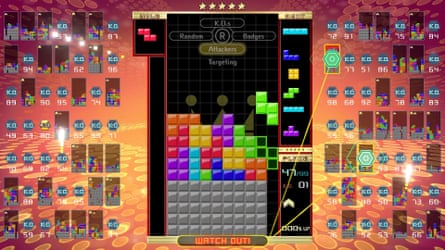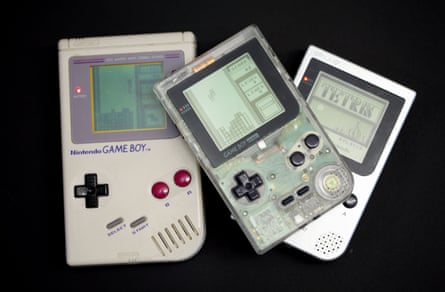Playing Tetris brings me a sense of peace and calm. I wish it could have the same effect on my family.
M
My entire family is living together once again, as my son Charlie’s attempt at attending university was cut short due to a suspicious landlord and unfulfilling party experiences. As a responsible parent, I should have convinced him to stay, but being 3,000 miles away from the only family member who is of legal drinking age and wants to go out with me was difficult. To kick off our first Saturday night together, I declare it a Family Game Night.
“I propose playing the multi-player version of Tetris available on PlayStation Plus. It could be an enjoyable experience!”
The youngest daughter, who is known for her mischievous ways, expresses her disapproval with an exasperated groan. She firmly says, “Absolutely not.”
“Why?”
“Boring.”
Why is Tetris not entertaining? I am already aware of the predictable outcome: Teen Tautology #1.
“Cos it is.”
It’s a clever variation on Descartes’ “I think therefore I am.” It’s boring cos it is.
I express my fondness for Tetris.
“That’s because you have autism,” she responds, playing with the nose ring that she got without asking our permission first. At least, I think that’s what she’s doing. I can’t see past the overwhelming amount of dyed black hair.
“What does ’tism” mean?”
“She sighs and mentions autism, Dad.” (She is not trying to be disrespectful towards me. Our family embraces diversity in neurological conditions. Like many teenagers, she may believe she knows more than me.)
“When did it start being referred to as ‘the ’tism’?”

I receive a nonverbal response to this. I cease organizing the refrigerator magnets in precise, evenly spaced rows and proceed to arrange the oils and vinegars with the most frequent use in the front. My eldest daughter enters the kitchen.
“Explain to Dad the reason behind his autism,” states the mischievous youngest child.
“You circle around a vacant parking lot until you come across a lone spot between two vehicles. You are unable to progress in a game without finishing all of the smaller tasks. You have fixed routines that you adhere to for tasks ranging from sleeping to cooking. You engage in self-dialogue whenever completing any task.”
“I must say, this is the best conversation I’ve ever had,” I respond.
“Additionally, Charlie possesses it.”
“Doesn’t Charlie’s blond Aryan hair, which he inherited from me, make quite a statement?”
The mischievous youngest daughter nonchalantly makes her way to her underground hideout to join her quiet friends in playing Mario 3D World.
I am okay with that. I only require four participants. This means I have to deal with one less family member. Gathering everyone together is always the most challenging aspect of playing games with family. My wife needs her slippers, my oldest has ADHD and OCD which requires special arrangements, and my son strangely gets nosebleeds right before we begin.
The game Tetris Effect: Connected has the potential to be incredible. Three players work together to compete against a fourth player. As they clear a certain number of lines, their individual playfields merge into one triple-width playfield, taking turns to play. Players can also send lines they clear to the fourth player’s playfield as a form of attack.
The idea is great in theory, but in reality, it’s a disaster when playing with my family. My wife keeps looking at the wrong part of the game. My oldest child’s thought process doesn’t allow her to wait for her turn on the longer game board. I end up giving orders and getting frustrated when they don’t listen. My son gets another nosebleed. It’s not enjoyable, it’s just stressful. They’ve turned a game that was originally peaceful and straightforward into a chaotic mess. It’s like creating a dance remix of a Beatles song.
Our gaming session is short-lived. The oldest child leaves to play the same Zelda game for the 10th time this week. My son goes back to playing Pikmin, with bloody tissue paper hanging from his nostrils like a dragon’s breath. I am reminded once more that I have lost count of the number of Nintendo consoles in our home. I can only assume they multiply while I am asleep.

I plead with my wife to join me in playing the simpler two-player option of Tetris Effect. She agrees and we have a successful game. We enjoy the satisfying feeling of smoothly fitting the shapes together to create perfect lines. Tetris has always had a calming effect on me, especially when played on the Game Boy. The simplicity of the game on a handheld device is comforting. The buttons are tactile and the design is clever, making even Apple products seem less appealing in comparison.
During our Tetris sessions, my spouse and I refrain from conversation. We are in a state of peaceful concentration. In a world filled with countless issues, it is refreshing to engage in a game focused solely on organizing and solving tasks.
However, the sensation is brief. It’s all just an illusion, isn’t it? Tetris deceives us like all the seemingly easy arcade games from our youth. Instructions that can be summed up in one sentence trick you into thinking you have control, until the pace picks up. In Tetris, there’s a moment when you fail to clear a line and you feel a sense of panic. Another one of those annoying Z blocks appears, and before you know it, you’re frantically struggling at the top of the screen, overwhelmed by the jumbled chaos.
Tetris serves as a reminder that, despite our efforts to maintain control, there are always limitations. Eventually, chaos will prevail once more. My desire is for a world where issues arise gradually, allowing ample opportunity to neatly solve them.
I turn off Tetris and convince my son to stop playing Pikmin so we can go out for drinks.
Source: theguardian.com

